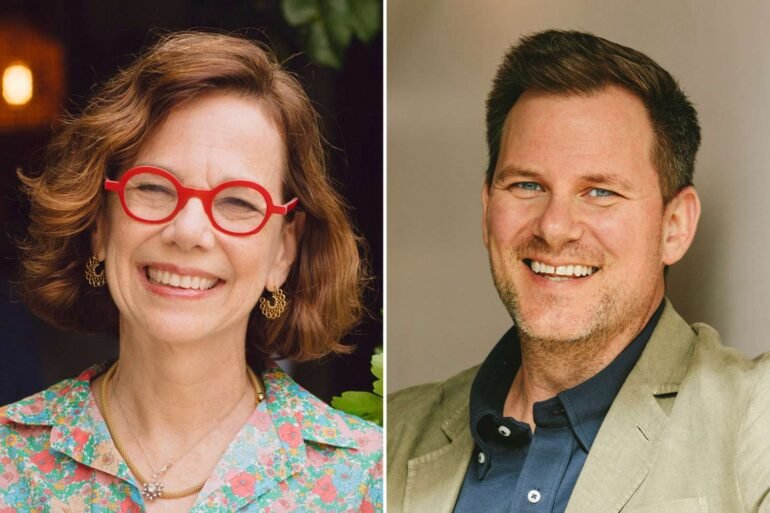:max_bytes(150000):strip_icc():format(jpeg)/Dana-Cowin-Hunter-Lewis-Tinfoil-Swans-FT-BLOG0925-ccd4494d85594f36914dc9ffb1a709de.jpg)
Dana Cowin, Hunter Lewis, the Rose, and the Thorn
Welcome to Season 3, Episode 22 of Tinfoil Swans, a podcast from Food & Wine. New episodes drop every Tuesday. Listen and follow on: Apple Podcasts, Spotify, or wherever you listen.
Tinfoil Swans Podcast
Spotify
On this episode
Food & Wine’s longest-serving editors in chief, Dana Cowin and Hunter Lewis, invite you into a revealing conversation about the history and impact of the Best New Chefs accolade since it started in 1988. From the early days of scouting talent with notebooks and stringers to today’s rigorous process shaped by mentorship, community, and culture, they share behind-the-scenes stories, heated debates, and the unforgettable moments that have defined the program — and American dining — for nearly four decades. Plus, can you beat them in a chef trivia quiz? Tune in and find out.
Meet our guests
Dana Cowin is an award-winning editor, author, speaker, and podcast host whose 21-year tenure as Food & Wine’s editor in chief helped shape America’s modern culinary scene. Under her leadership, Food & Wine expanded into digital, video, and social platforms, and reinforced its role as a trendsetting force in food culture. She founded the Progressive Hedonist venture to fight the climate crisis through food and joy, hosts the podcast of the same name, advises food and storytelling brands, and works with organizations like Hot Bread Kitchen, City Harvest, and Food Education Fund to provide equitable access to food and education.
Hunter Lewis has been the editor in chief of Food & Wine since 2017, leading a team that has earned multiple James Beard and IACP Awards and a National Magazine Award from the American Society of Magazine Editors. Prior to that he was the editor in chief of Cooking Light, executive editor of Southern Living, food editor of Bon Appétit, and kitchen director of Saveur. Lewis cooked under chef Jonathan Waxman in Sonoma County, California, and as a line cook at Barbuto in New York City. A graduate of the University of North Carolina at Chapel Hill, he was also a reporter for The Herald-Sun in Durham, North Carolina. You can find him in his home kitchens in Birmingham, Alabama, and New York City cooking for his friends and family, on Instagram @notesfromacook, and as a guest judge on Bravo’s Top Chef. His upcoming cookbook, Just Play the Hits, will be be published by Union Square & Co.
Meet our host
Kat Kinsman is the executive features editor at Food & Wine, author of Hi, Anxiety: Life With a Bad Case of Nerves, host of Food & Wine’s Gold Signal Award-winning podcast Tinfoil Swans (currently a finalist in the Folio Awards), and founder of Chefs With Issues. Previously, she was the senior food & drinks editor at Extra Crispy, editor in chief and editor at large at Tasting Table, and the founding editor of CNN Eatocracy. She won a 2024 IACP Award for Narrative Food Writing With Recipes and a 2020 IACP Award for Personal Essay/Memoir, and has had work included in the 2020 and 2016 editions of The Best American Food Writing.
She was nominated for a James Beard Broadcast Award in 2013, won a 2011 EPPY Award for Best Food Website with 1 million unique monthly visitors, and was a finalist in 2012 and 2013. She is a sought-after international keynote speaker and moderator on food culture and mental health in the hospitality industry, and is the former vice chair of the James Beard Journalism Committee.
Highlights from the episode
On how it all started
“In 1988, Food & Wine editor Malachy Duffy is walking down the street and he walks into restaurant Rakel, and he has a game-changing meal cooked by Thomas Keller, who becomes one of the first Best New Chefs.” — Lewis
“A little history: There had been a 60 restaurant and chef list in Food & Wine in 1983 called ‘The Honor Roll of American Chefs.’ In 1985, there was a ’25 Hot New Chefs’ list. Then-editor in chief Ila Stanger’s editor’s note from that first class in 1988 is specifically about looking for diner satisfaction. It was about chefs who make diners happy every single time they come in the door. Her 1989 editor’s letter was along those same lines, but they were looking specifically for chefs who made a meal in February as good as a meal in October; they were really prioritizing consistency. Then, Dana, I read your first [Best New Chef] editor’s letter where you couched it as the people who are shaping the future of American cuisine.” — Kinsman
“When I came to Food & Wine, I was the executive editor, so my first class really was the following year. It was the most fun I had ever had, first helping identify the Best New Chefs — that was a team effort — then calling them and saying, ‘Are you somewhere private? I wanted to share some news.’ The joy of making not someone’s day, not someone’s week, but potentially their career was incredible.” — Cowin
On how the Best New Chef sausage gets made
“Back in the day, the process for finding the Best New Chefs was very belabored. We had a notebook, we had paper, we had stringers around the country. The sorting mechanism just to try to find the people was really tricky because it was before the internet and a much greater flow of information. Over time, the Best New Chefs alumni became some of the best sources of information. The idea that they continue to be a part of this and recognize what it did for them, what it can do for the industry, and what it can do for the people who are up and coming is great.” — Cowin
On how you can tell when someone is making Best New Chef magic
“One of my measurements for ‘Is this [Best New Chef] material?’ is goose bumps. You feel that magic and the hair raise in the back of your neck. It’s a feeling that you’re eating food that nobody else in the country is cooking.” — Lewis
On shifting with the seasons
“The pandemic changed the nature of what Best New Chefs is and the criteria that we use. Hunter, you said that your eyes lifted up from what was on the plate and out into the community. The chefs who have come after this shift are community leaders in an incredible and fundamental way.” — Kinsman
“The world split open with #MeToo, and having come from restaurants and been on the inside as a restaurant cook here in New York City and elsewhere, and knowing how restaurants operated as these rogue pirate ships with no HR departments — you are working with some of the best people in the entire world, and you are working with ne’er-do-wells too. #MeToo really changed our process. That’s when we started background checks, that’s when we started the kitchen culture surveys in Spanish and English that are mandatory. It’s not perfect, but trying to put rigor behind the process is part of protecting this legacy.” — Lewis
On moving Best New Chefs further down the road
“Dana, we’ve gone back to your original scouting method where we have multiple editors criss-crossing the country and breaking down the country by geography. With Roy Choi and what now seems really like a quaint argument if a food truck is a restaurant — now you look at Roy’s legacy and what he’s done over the past 20 years and of course it’s obvious. But did that get heated?” — Lewis
“There was always a question of what are the parameters? What are the farthest edges of Best New Chef, like Dave Chang with the noodle shop? Is that a Best New Chef? We had created a separate Best New Chef for pastry, because back in the day, we thought pastry was a different thing. You can’t put that in an award. Could a food truck be legit? But the food was so brilliant and met all of our standards in terms of creativity, originality, and the possibility of staying power. Is this person going to influence the way that we eat in the future? The answer for Roy Choi was most definitely.” — Cowin
On watching history being made
“As fun as the party is, as fun as putting together the profiles and the layouts and the issues is, the time we spend in the mentorship program is the most special time. We’re all together with the new class at 9 a.m. Eastern, when the announcement goes out, and the chefs’ phones immediately start to buzz. You can feel the energy in the room change immediately, and their lives have changed overnight. Being in that room, sequestered with some of the [Best New Chef] alumni and other leaders in the industry, and being able to talk in real time as their lives are changing about how to really take this next step and how to approach the next year — it’s a special moment.” — Lewis
About the podcast
Food & Wine has led the conversation around food, drinks, and hospitality in America and around the world since 1978. Tinfoil Swans continues that legacy with a new series of intimate, informative, surprising, and uplifting interviews with the biggest names in the culinary industry and beyond, sharing never-before-heard stories about the successes, struggles, and fork-in-the-road moments that made these personalities who they are today.
This season, you’ll hear from icons and innovators like Roy Choi, Byron Gomez, Vikas Khanna, Romy Gill, Matthew Lillard, Ana and Lydia Castro, Laurie Woolever, Karen Akunowicz, Hawa Hassan, Dr. Jessica B. Harris, Wylie Dufresne, Samin Nosrat, Curtis Stone, Tristen Epps, Padma Lakshmi, Ayesha Curry, Regina King, Antoni Porowski, Run the Jewels, Chris Shepherd, Tavel Bristol-Joseph, Paola Velez, Bryan Caswell, Harry Hamlin, Angela Kinsey, Hunter Lewis, Dana Cowin, Edward Lee, Cassandra Peterson (a.k.a. Elvira), Ruby Tandoh, and other special guests going deep with host Kat Kinsman on their formative experiences; the dishes and meals that made them; their joys, doubts and dreams; and what’s on the menu in the future. Tune in for a feast that’ll feed your brain and soul — and plenty of wisdom and quotable morsels to savor.
New episodes drop every Tuesday. Listen and follow on: Apple Podcasts, Spotify, or wherever you listen.
These interview excerpts have been edited for clarity.
Editor’s Note: The transcript for download does not go through our standard editorial process and may contain inaccuracies and grammatical errors.
Kat Kinsman
2025-09-16 11:38:00

